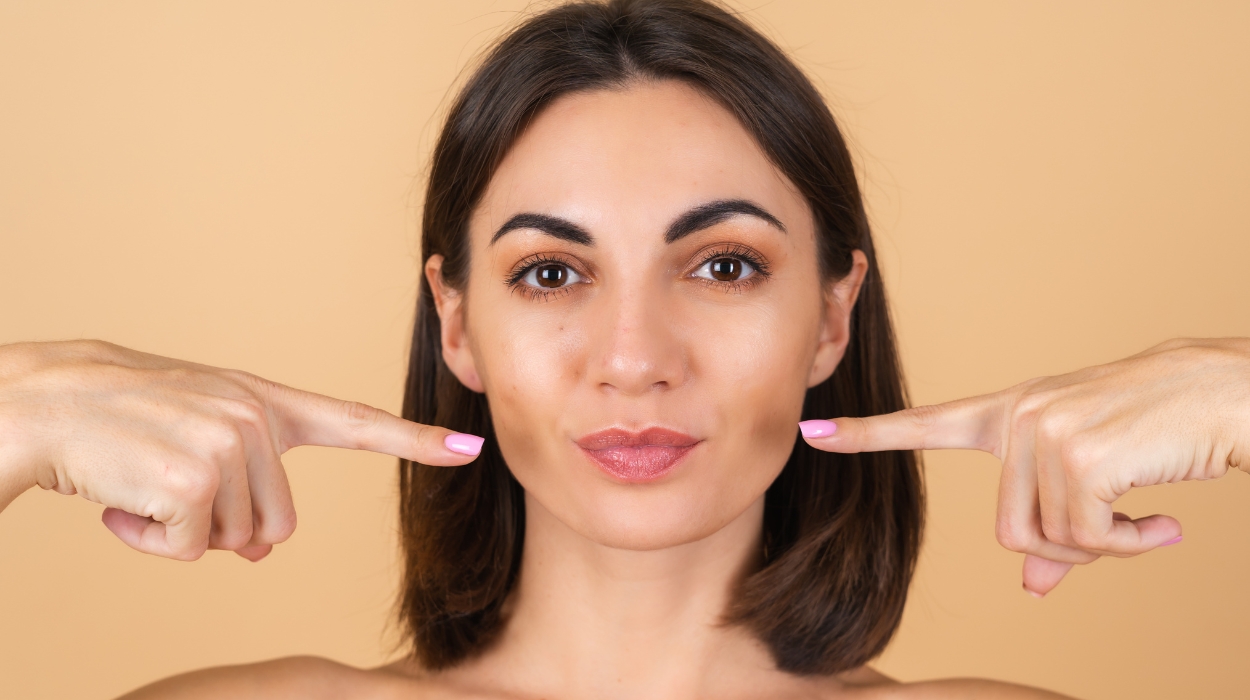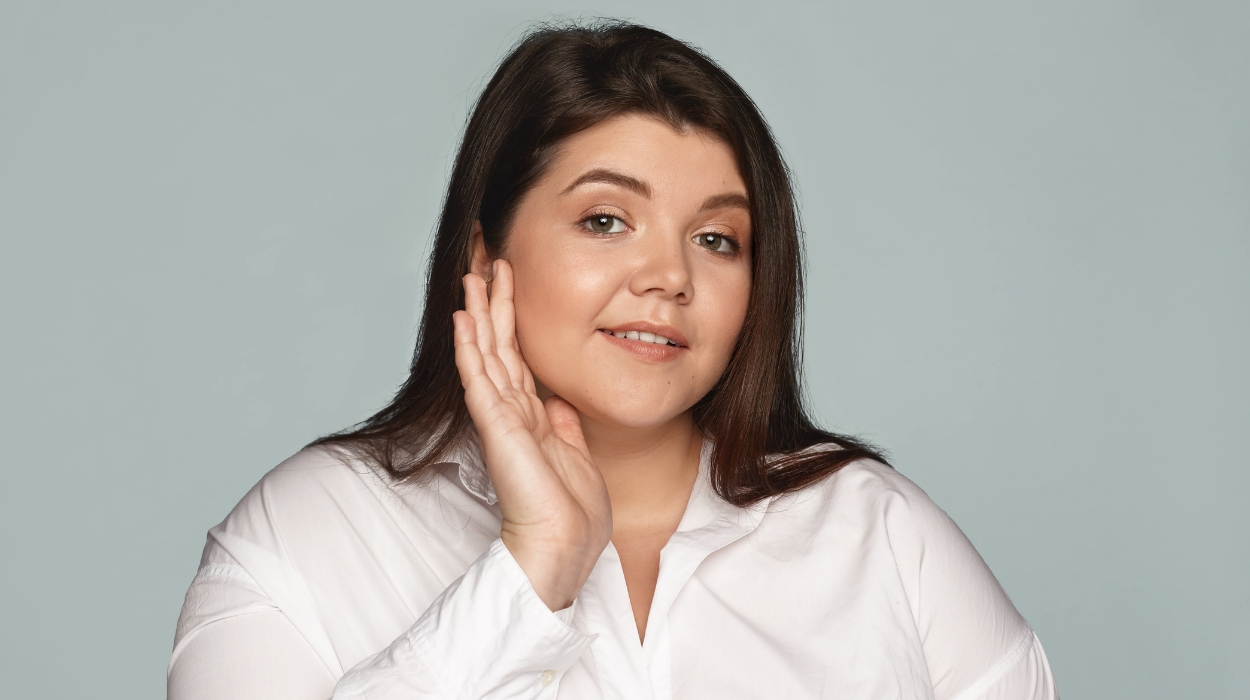Babies with chubby cheeks are cute. Grown adults who have fuller-looking faces may feel differently. Excess facial fat occurs for several reasons.
Medical conditions, medications, or weight gain may contribute to facial fat. It is common when you have gained body weight that it is evident in your face. Sometimes cheeks look puffy for other reasons.
Maybe you consume too many refined carbohydrates, which can cause weight gain and a fuller-looking face. It is important to know how many carbs per day and what types are best to eat for weight loss.
Lifestyle activities may contribute to chubby cheeks. Consider how well you manage your daily life. Are there any less-than-stellar habits that may cause your face to look puffy?
Whatever the cause, you may wonder how to lose cheek fat. This article will discuss seven ways to achieve a slimmer-looking face.
How To Lose Cheek Fat: 7 Tips For Slimmer Cheeks
- Avoid refined carbs and processed foods.
- Decrease sodium intake.
- Cardio and strength training.
- Try facial exercises.
- Eat nutrient-dense food.
- Improve self-care.
- Consider a medical or surgical procedure.
7 Most Effective Ways To Get Rid Of Chubby Cheeks

We may call them chubby cheeks, but cheek fat is known as buccal fat in medicine. It refers to fat in the area between the cheekbone and jawline. Genetics, face shape, and age influence how much facial fat you have.
When you gain weight, fat accumulates over the entire body – the same as when you lose weight. You cannot target specific areas while pursuing weight loss. Fat is lost everywhere.
Therefore, you cannot reduce fat in your face only when you lose weight. With that in mind, if you want to learn how to lose face fat, let us discuss seven tips below you can try. Changing some daily habits may positively influence changes in your body and face.
Avoid Refined Carbohydrates And Processed Foods
Highly processed foods are nutrient-poor and unhealthy if overconsumed. Research indicates refined carbs contribute to obesity. They disrupt appetite regulation[1] and feelings of fullness, which influence caloric intake.
Processed sugary foods and beverages are associated with obesity.[2] Evidence shows higher quality carbohydrates, like whole grains and fruit, did not promote weight gain. Thus, when you wonder how to get rid of chubby cheeks, consider choosing complex carbs over refined ones.
Processed foods are higher in sodium than whole foods, which can cause you to retain extra fluid in your body. The next section will provide details about sodium.
Decrease Sodium Intake
Consuming too much sodium causes fluid retention. Research shows that a low-sodium diet is associated with total body water reduction[3] without reducing body fat mass. Nonetheless, reduced water retention in the body results in decreased puffiness overall.
Seems odd but making sure you drink an adequate water amount of water aids against fluid retention. Your body requires a certain amount of water to function properly. If it lacks water, the body will hold fluid until the proper balance is restored.
Cardio And Strength Training
Aerobic exercise trains the cardiovascular system and burns calories. Cardio exercise includes activities such as running, cycling, and swimming. Cardio exercises contribute to fat burning and burn more calories in the same time frame as strength training.
Burning calories helps to create a calorie deficit. Understanding how much of a calorie deficit to achieve is important if losing weight is your goal.
Some supplements may aid your body’s ability to burn fat. As part of a healthy lifestyle, a supplement may curb appetite and support fat loss. Please consult a doctor before using any supplement.
Strength or resistance training builds more lean muscle mass than cardio alone. A higher lean muscle mass to fat ratio increases metabolic rate, which burns more calories at rest. Research indicates that both[4] cardio exercises and resistance training promote weight loss.
Try Facial Exercises
Facial muscles support your face and require exercise just like the rest of the body. Specific facial exercises can improve the muscle tone of your face, even if they may not help reduce facial fat. Simple facial expressions will tone facial muscles.
Pursing your lips, performing a blowing motion, and making a fish face are exercises that tone facial muscles. This article offers more exercises to lose face fat or at least activate the facial muscles to improve the structural appearance of your face.
Gaining excess body fat shows up in the face too. However, the results of overall weight loss will be evident in fat loss of the face as well. Exercising those cheek muscles will help you chew up all the veggies we will discuss in the next section.
Eat Nutrient-Dense Food
Whole grains, fruits, vegetables, and beans are full of daily essential nutrients. Nutrient-dense foods contain fiber, protein, carbohydrates, and fatty acids, which are required for optimal health and function. These foods create a sense of fullness, satiate hunger, and are lower in calories than processed foods.
Their nutritional components offer health and weight management benefits. Research showed effective weight loss when participants consumed nutrient-dense foods in a whole-food plant-based[5] diet. Additionally, the whole-food plant-based diet demonstrated a reversal of heart disease in the majority of patients.
Eating nutritional whole foods promotes both health benefits and weight loss. It may be tough for busy folks to eat a healthy balanced diet consistently and realize similar study results. Nutritional support can help in these cases by offering veggies and fruits in supplement form.
It is important to consult a healthcare provider before using any supplements. Also, consider reading reviews to aid determination of the quality and reliability of nutritional supplements.
Improve Self-Care
Self-care refers to actively doing things to support your well-being. In addition to eating a healthy diet and exercising regularly, getting enough sleep supports overall health and weight management. Research shows prolonged sleep disturbance[6] can affect the stress hormone cortisol.
Prolonged elevated stress and sleep deprivation[7] are associated with metabolism dysregulation and increased fat storage. Hence, regulating sleep patterns and learning to manage stress levels is beneficial for health and weight management and would be considered good self-care.
Alcohol consumption is another aspect to consider regarding self-care. Drinking too much alcohol causes dehydration which can lead to water retention. Retaining fluid may cause a puffy face – so the opposite effect when you want to lose puffy cheeks.
Medical Or Surgical Procedure
There are several medical options to decrease face puffiness and reduce face fat. Dermatologists and plastic surgeons may help you find some medical and surgical solutions to how to lose cheek fat and get a jawline.
A plastic surgery technique performed to slim cheeks is called buccal fat pad[8] excision. It has become a popular cheek refinement procedure. Buccal fat removal enhances the mid-face appearance.
Lipolysis is a non-surgical alternative[9] to liposuction used to reduce fat. Fat-dissolving solutions are injected into facial areas improving contouring. Phosphatidylcholine and deoxycholic acid are the most commonly used solutions for reducing facial fat in injection lipolysis.
Facial contouring[10] is another non-surgical option to improve the overall appearance of the face. This procedure uses dermal fillers and Botulinum Toxin A to increase support of the facial structure. However, there may be several side effects and individual health concerns that you should be informed of by your doctor beforehand.
Causes Behind Fat In Your Cheeks And Face

Facial shape is genetic. If you have a round-shaped face, your face will appear fuller than a person with an oval-shaped face.
Cushing’s syndrome[11] occurs when the body makes too much cortisol over time. It can also be caused by taking medications called glucocorticoids. Medications such as corticosteroids can cause a moon-shaped, rounded face as a side effect.
Gaining body weight will also be evident in the face. As mentioned previously, when excess fat accumulates, it happens over the entire body. Overindulgence of alcohol, consuming too much sodium, poor sleep quality, and elevated stress levels can all contribute to weight gain and chubby cheeks.
Aging causes changes[12] in the facial skin, fat pads, and muscles and thus your facial appearance. These structures may reposition, causing an imbalance of facial tissue. The result may be a droopy-looking face due to cheek fat pads descending down the face from being unsupported.
Conclusion
Not eating a balanced diet and exercising regularly affect weight management. Consuming poor-quality processed food, being physically inactive, and not drinking enough water can all contribute to increased face or cheek fat. Therefore, if you want to lose facial fat, you should aim to make better lifestyle choices to improve overall health.
Managing a healthy lifestyle requires doing activities to improve self-care. Being mindful of your alcohol consumption, sodium intake, stress levels, and amount of sleep supports wellness.
The takeaway is you cannot target weight loss in one area of your body. There is no method to discover how to lose cheek fat fast – or how to lose cheek fat overnight. A comprehensive approach is required to balance a healthy lifestyle, maintain a healthy weight, or achieve fat loss.
Frequently Asked Questions
Though you cannot target specific body parts to reduce their size, eating a healthy diet and exercising regularly can help slim your body. Facial exercises can improve the tone of your face for a better aesthetic.
There is no method to lose fat in your cheeks fast. Weight loss requires a combined effort of managing a healthy diet and regular exercise. Fat loss occurs over the entire body.
Facial exercises will improve the muscle tone in the face giving the appearance of reduced fat and a better aesthetic. Overall, body weight loss is required to reduce fat.
Chubby cheeks can be a result of genetics. The natural shape of your face may make it appear more full-looking. Some medical conditions and medications can cause a round-looking face.
 Evidence Based
Evidence Based
